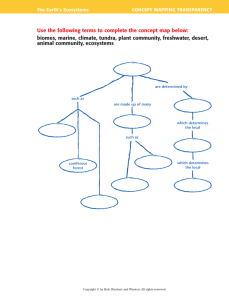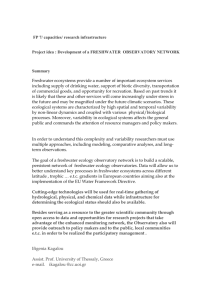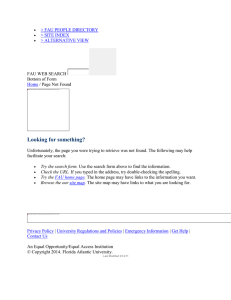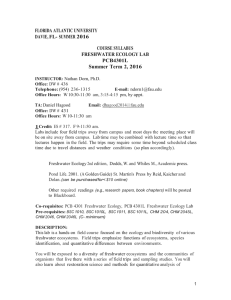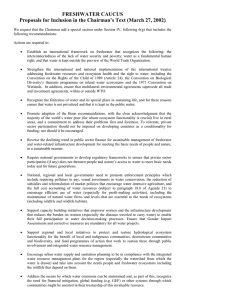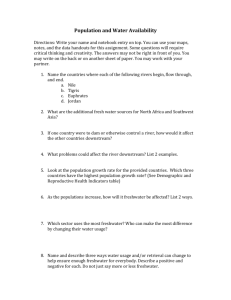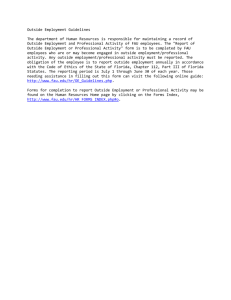2016 PCB4301 Summer Term 2, 2016
advertisement
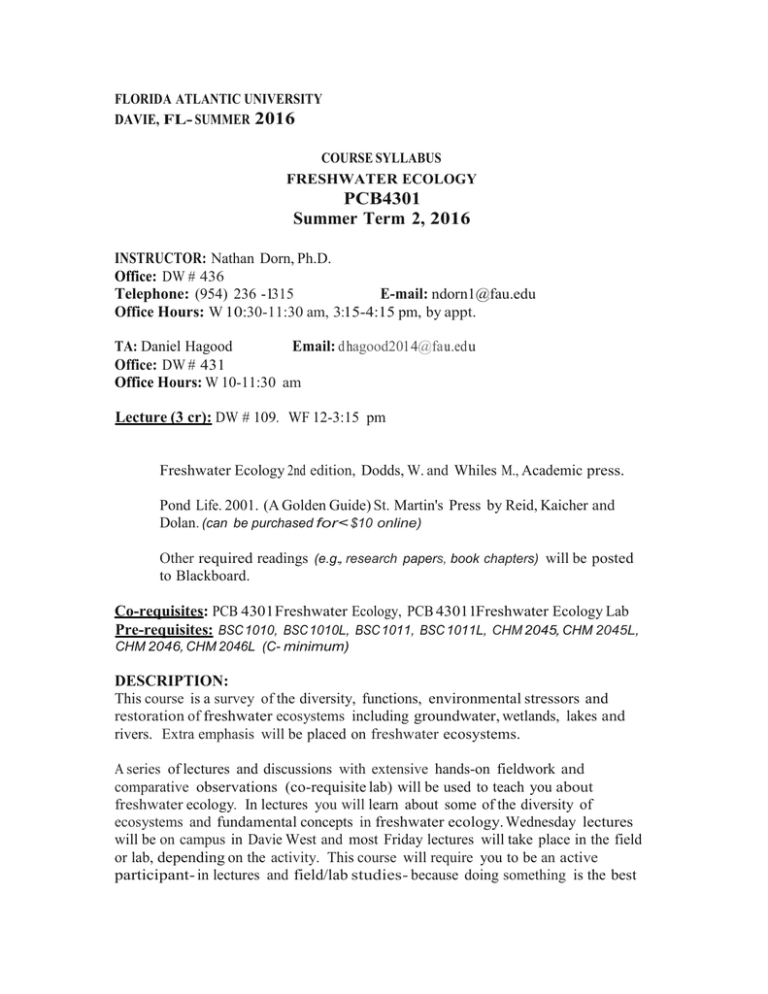
FLORIDA ATLANTIC UNIVERSITY DAVIE, FL- SUMMER 2016 COURSE SYLLABUS FRESHWATER ECOLOGY PCB4301 Summer Term 2, 2016 INSTRUCTOR: Nathan Dorn, Ph.D. Office: DW # 436 Telephone: (954) 236 -1315 E-mail: ndorn1@fau.edu Office Hours: W 10:30-11:30 am, 3:15-4:15 pm, by appt. TA: Daniel Hagood Email: d hagood201 4@fau.ed u Office: DW # 431 Office Hours: W 10-11:30 am Lecture (3 cr): DW # 109. WF 12-3:15 pm Freshwater Ecology 2nd edition, Dodds, W. and Whiles M., Academic press. Pond Life. 2001. (A Golden Guide) St. Martin's Press by Reid, Kaicher and Dolan. (can be purchased for< $10 online) Other required readings (e.g., research papers, book chapters) will be posted to Blackboard. Co-requisites: PCB 4301Freshwater Ecology, PCB 43011Freshwater Ecology Lab Pre-requisites: BSC 1010, BSC 1010L, BSC 1011, BSC 1011L, CHM 2045, CHM 2045L, CHM 2046, CHM 2046L (C- minimum) DESCRIPTION: This course is a survey of the diversity, functions, environmental stressors and restoration of freshwater ecosystems including groundwater, wetlands, lakes and rivers. Extra emphasis will be placed on freshwater ecosystems. A series of lectures and discussions with extensive hands-on fieldwork and comparative observations (co-requisite lab) will be used to teach you about freshwater ecology. In lectures you will learn about some of the diversity of ecosystems and fundamental concepts in freshwater ecology. Wednesday lectures will be on campus in Davie West and most Friday lectures will take place in the field or lab, depending on the activity. This course will require you to be an active participant- in lectures and field/lab studies- because doing something is the best way to learn something. The two portions of the course (lecture and lab/field) are integrated and you must take them both simultaneously. You are expected to participate in group work and ask questions during lecture. You are expected to read assigned chapters and other readings before class. In the co-requisite lab you will be experienced a diversity of freshwater ecosystems with field trips and sampling studies. OBJECTIVES: This course is intended to provide a general understanding of the diversity, functions and threats to freshwater ecosystems. You will also gain comprehension of some important ecological processes that determine the structure and dynamics of freshwater communities and will be introduced to the basics of ecological research. When you complete this course, you should have a general understanding of freshwater ecology, and specific knowledge about the biota, ecology, and restoration of Florida's freshwater ecosystems. 1. COURSE POLICIES AND PROCEDURES The course will be taught with a combination of lectures, class discussions and inclass presentations that will be coordinated with the co-requisite lab. Reading the sections of the book will prepare you for reading quizzes, class discussions, lectures, and the final exam. The highlighted portions of the textbook will be the backbone of the lectures and students should read the text and other assigned readings prior to each class. Material for weekly Quizzes, Assignments and the Final Exam will come from the books, other readings, lectures, and lab notes. Powerpoint presentations will be posted on Blackboard after each lecture is completed. It is your responsibility to make up material covered in class if you must be absent. Please recognize that missing a single day in the short summer semester is like missing 2.5 lectures in a regular semester. Attendance: This is an intellectually challenging and time-demanding course. Students with other time-consuming responsibilities (heavy course loads, jobs > 20 hrfwk, athletics, music groups, etc.) should seriously consider their ability to meet these demands. You are expected to attend and actively participate in every lecture, lab, and field experience. You will not be able to make up missed lab or field activities. Work Outside of Class: You are completing three credit hours of coursework in six weeks. It is expected that the weekly readings, assignments, and preparation of presentations will require another 12-14 hours per week outside of class. Classroom Etiquette: Behavior that is responsible and considerate of others is expected at all times. A student engaging in persistent (i.e., repeated within or across meeting times) and deliberately disruptive or antagonistic behavior will be 2 asked to leave the class, and will receive an F in the course. Persons engaging in threats or bullying will be reported to the University Police Department. Grade: The grade for the lecture will be determined by total points obtained on five assignments worth 10 points each (SO total), five 10-point quizzes on the readings (SO total), two presentations (50 points), discussion participation (30 points) and an open note/open book exam on the final day of class (120 points). Lecture Point Distribution: Final Exam: 120 points Reading quizzes: 50 points Assignments: 50 points Presentations: 50 points Discussion/Participation: 30 points Total: 300 points There will be NO individualized extra credit in the course. Grading Scale: A = 93 - 100% A- = 90- 92% B+ = 86 - 89% B = 83- 85% B- = 80- 82% C+ = 76- 79% c = 70- 75% D = 60- 70 o/o F = < 60% Assignment grade policy: If no other late policy is in place then the default is that late assignments (late means after the due date at the start of class) receive a ZERO. Assignments that are not handed in according to the specified format or otherwise according to the instructions for that assignment will be considered late and also receive a ZERO. Assignments that are handed in late receive a 10% initial deduction and a ZERO if they are more than 24 hours late. MAKE-UP EXAMS: A make-up examination must be taken if the student misses the final examination or a quiz for a reason considered appropriate in the undergraduate catalog. It is up to the instructor to decide if a make-up examination will be given if a student misses an exam for any other reason and will only be given after an automatic penalty of 10%. Only ONE makeup examination per student will be allowed. Advanced -schedule conflicts (e.g., athletic competitions, religious observance) must be discussed with the instructor in the first week of class to be eligible for a make-up exam. Make-up examination will only be allowed if the student brings in appropriate medical documentation (with the Doctors name and office number) or documentation of legal obligations for missing the exam. Disability Policy: In compliance with the Americans with Disabilities Act (ADA), students who require reasonable accommodations due to a disability to properly execute coursework must register with the Office of Student Accessibility Services (SAS) and follow all SAS procedures. SAS has offices across three of FAU's campuses- Boca Raton, Davie, and Jupiter, however, disability services are available for students on all campuses. 3 Academic Integrity: FAU students are expected to maintain the highest standard of academic integrity as outlined in the Undergraduate Catalog. Academic dishonesty, including copying the work of someone else (i.e., plagiarism) whether that someone is a classmate or an internet source, is considered a serious breach of these ethical standards, because it interferes with the university mission to provide a high quality education in which no student enjoys an unfair advantage. Academic dishonesty is destructive of the university community, which is grounded in a system of mutual trust and places high value on personal integrity and individual responsibility. Harsh penalties are associated with academic dishonesty. For more information see University Regulation 4.001at http://www.fau.ed u/ctl /4.001 Code of Acad em ic In tegrity.pdf Plagiarism in this course includes aiding the person who plagiarized and the penalty for letting someone copy your work will result in a zero. More than one instance of plagiarism will result in course failure and an official write up to the chair of the Biology department and the Dean of Student Services. 5. Incomplete Grade: A grade of Incomplete ("I") is reserved for students who are passing a course but have not completed all the required work because of exceptional circumstances. A grade of "I" will only be given under certain conditions and in accordance with the academic policies and regulations put forward in FAU's University Catalog. The student must show exceptional circumstances why requirements cannot be met. A request for an incomplete grade has to be made in writing with supporting documentation, where appropriate. As per university policy, an incomplete grade will only be given to a student who fulfills all of the following criteria: a. misses multiple exams or the final examination due to a legitimately documented emergency as defined by the FAU Academic Policies and Regulations (h ttp://www.fa u.ed u /academic/ registra r/09-10 cata log/academics.html) b. has a grade of C or better c. submits evidence of the emergency and signs an incomplete agreement. Additional Policies Disability Policy In compliance with the Americans with Disabilities Act (ADA), students who require reasonable accommodations due to a disability to properly execute coursework must register with the Office of Student Accessibility Services (SAS) and follow all SAS procedures. SAS has offices across three of FAU's campuses- Boca Raton, Davie, and Jupiter, however, disability services are available for students on all campuses. Religious Accommodations: Students who wish to be excused from course work, class activities or examinations must notify the instructor in advance of their intention to participate in religious observation and request an excused absence. 4 Course Schedule DATE TOPIC/QUIZ May 18 & 20 Lecture: Introduction Water, Hydrologic cycle Groundwater (filling out waivers) Diversity of urban ponds May 25 & 27 Readi11g Quiz 1 Lecture: Groundwater, Wetlands, Everglades. Wetland Habitats and Plants Reading (charter Due or pages)1 DW chapters1-4 PL (pp 4-37, 74-75, Assignment 1 120-128) DW ch. 4-5 Lodge ch. 1 PL (pp 42-72, 114115, 136-150) Assignment 2 •note lab species lists Lodge ch. 3 June 1 & 3 Reading Quiz 2 Lecture: Watershed Restoration Lentic Ecosystems - part I June 8 & 10 June 15 & 17 DW chapter 7 Paper: Cheek et a!. 2014, TBD Reading Quiz 3 Lecture: Lentic Ecosystems - part II DW chapter 20 ow 658-662 Fish, food webs and community interactions PL (pp 74-119), DW 238-251 Readi11g Quiz 4 Lecture: Lotic Ecosystems Lecture: Nutrient Dynamics DW chapter 6, pp pp 650-658 STUDENT PRESENTATIONS: Wetland plants and hydroperiod. Assignment 3 Assignment 4 Fauna Paper approval and outline for presentation 2. DW chapter 15 Lodge pp 168-172 River Habitats, flow and benthos. June 22 & 24 Readiug Quiz 5 Lecture: Eutrophication, Paper: TBA DW chapters 16, 18 Assignment 5 STUDENT PRESENTATIONS: 5 Toxins, Acidification. Freshwater Fauna (paper presentations) Open Note FINAL exam (3+ hours, on the 241h) END OF SESSION June 27 I DW - Dodds and Whiles, PL - Pond Life booklet, Lodge - Everglades Handbook (Lodge chapters and other papers will be made available on Blackboard) Important Dates June 20: Last day to drop without receiving an F. For other important dates see http:/ jwww.fau.edu/registrar/pdf/DocsjacadcallOll.pdf 6
